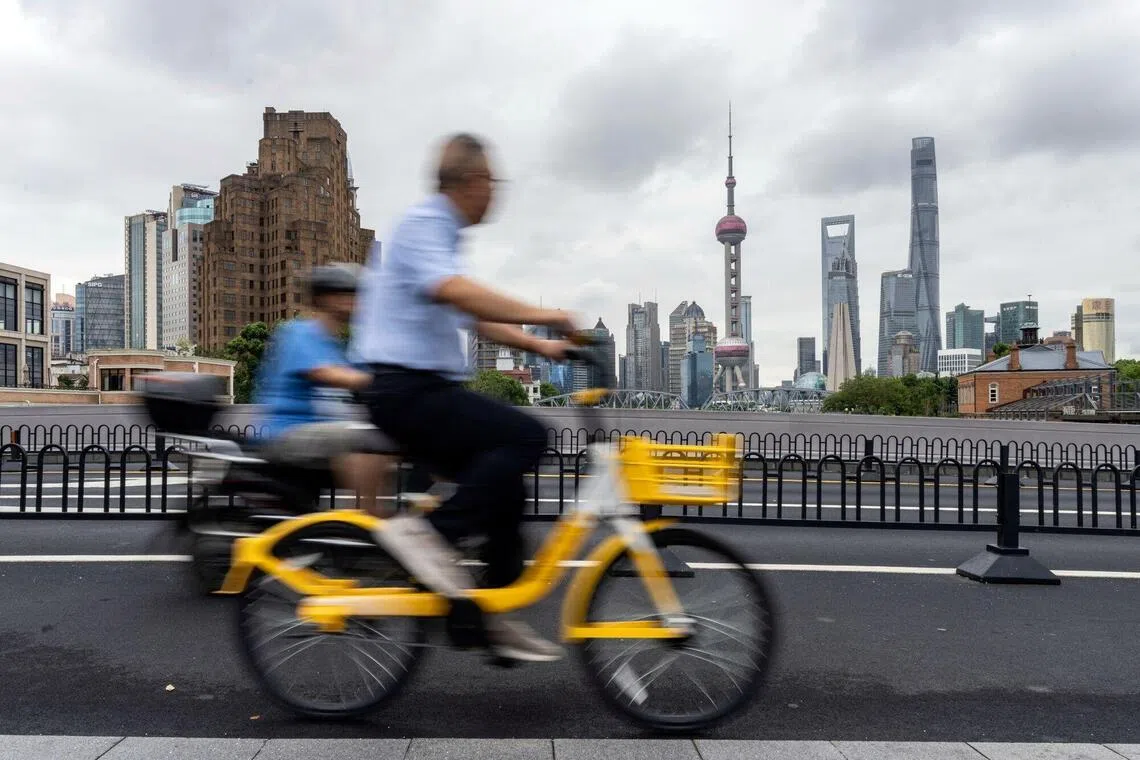China’s economy posts another sharp slowdown as investment slumps
Sign up now: Get ST's newsletters delivered to your inbox

China’s economic activity slowed more than expected across the board in August with a sharp slump in investment.
PHOTO: BLOOMBERG
Follow topic:
BEIJING – China’s economic activity slowed more than expected across the board with a sharp slump in investment, adding to the likelihood that policymakers will roll out more stimulus to ensure growth stays on track to hit the official target.
Industrial output and consumption had their worst month yet in 2025 after a sharp slowdown in July. Production at Chinese factories and mines expanded 5.2 per cent in August from a year earlier, according to data from the National Bureau of Statistics (NBS) on Sept 15, the smallest gain since August 2024. Retail sales grew 3.4 per cent on year in August, slower than an expectation for an increase of 3.8 per cent and down from 3.7 per cent in the previous month.
Expansion in fixed asset investment in the first eight months of the year decelerated sharply to 0.5 per cent, the worst reading for the period since 2020.
The data “confirms a sharp slowdown in the second half of 2025, especially on the investment side,” said Mr Carlos Casanova, senior Asia economist at Union Bancaire Privee in Hong Kong.
With a boom in exports cooling off, many analysts and investors expect a downshift in China’s economy during the final months of 2025 after it clocked growth of 5.3 per cent in the first half.
The extent of the deceleration in China, set to be the top contributor to global growth over the next five years, will matter to a vulnerable world economy that is slowing under pressure from US President Donald Trump’s tariffs.
China’s investment in August contracted sharply in a number of industries, such as the manufacturing of pharmaceuticals, machinery and raw chemicals, as well as in education and healthcare. The surveyed urban unemployment rate deteriorated to 5.3 per cent.
The economy’s surprisingly upbeat performance in the first half of 2025 has left China’s leadership confident of reaching the official growth target of around 5 per cent even in case of a relatively pronounced slowdown later in the year. So far, policymakers have shown little sign of preparing major new stimulus as exports prove resilient during Mr Trump’s second trade war.
China needs to “focus on stabilising employment, enterprises, markets and expectations,” the NBS said in the statement. “There are still plenty of instability and uncertainties with the external environment, and the economy still faces many risks and challenges.”
Yet new challenges are emerging, as evidenced by a series of disappointing data readings in recent weeks. A broad measure of credit slowed in August for the first time in 2025, while export growth fell short of forecasts and dropped to 4.4 per cent in August. The labour market also likely weakened in recent months, based on purchasing managers’ index surveys and private polls.
Another source of pressure for the economy is the government’s “anti-involution” campaign that aims to ease overcapacity and excessive competition among firms. The effort escalated in early July and may have contributed to a fall in output that month for products ranging from steel to copper.
Even though traders have pushed equities higher in anticipation that the measures will restore profitability across the economy, the government still risks hurting employment and consumption in the absence of a major stimulus package for demand.
How the campaign unfolds remains highly uncertain, making it difficult to judge when China might be able to break the grip of entrenched deflation.
“China’s August data are hardly inspiring – exports remain under tariff pressure while the property downturn continues to weigh on domestic demand,” said Ms Charu Chanana, chief investment strategist at Saxo Markets in Singapore.
“Yet markets are shrugging it off, with cash-rich households rotating into equities and AI momentum powering chip stocks higher.” BLOOMBERG

